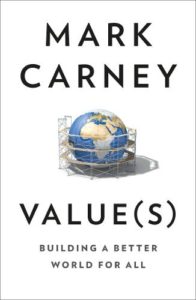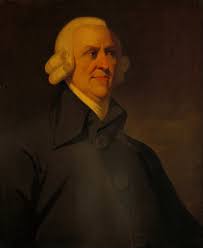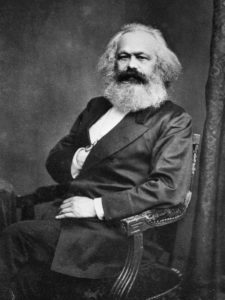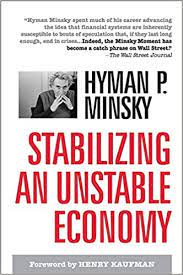Updated 20 April 2025
Mark Carney, the much-celebrated central banker from Canada has a new book entitled Value(s). This 600-page (with endnotes) book represents a much-awaited synthesis of his ideas from his days as bank governor, senior Finance official, and Goldman Sachs investment banker. His return to Ottawa, appointment at Brookfield and earlier appointment as the U.N. Special Envoy for the Environment might seem like a crowning achievement but Dr. Carney’s career has probably not peaked yet. Naturally there is much speculation about his future relationship with the Liberal Party of Canada but it strikes me that his ambitions (and talents) are more global in nature.
 Carney is not what I would consider a conventional economist. His D.Phil at Oxford was entitled “The dynamic advantage of competition,” an not uncustomary topic for an economics thesis. In Value(s) however he takes on a subject which is fully consistent with Oxbridge’s attention to the marriage of politics, economics and philosophy. Carney’s reading is wide as is his abiding interest in history, notably financial history. In the opening pages of the volume, he recounts his entry to the Bank of England, noting portraits of his predecessors (120 or so) and images of Roman coins and Mercury, the god of commerce.
Carney is not what I would consider a conventional economist. His D.Phil at Oxford was entitled “The dynamic advantage of competition,” an not uncustomary topic for an economics thesis. In Value(s) however he takes on a subject which is fully consistent with Oxbridge’s attention to the marriage of politics, economics and philosophy. Carney’s reading is wide as is his abiding interest in history, notably financial history. In the opening pages of the volume, he recounts his entry to the Bank of England, noting portraits of his predecessors (120 or so) and images of Roman coins and Mercury, the god of commerce.
The thrust of Carney’s argument can be conveyed by his reference to Oscar Wilde’s famous aphorism about “knowing the price of everything and the value of nothing.” So, what is value? How do we measure value? Where does value originate? Carney’s sets this question up as a foil to build upon what he sees as fundamentally an imbalance in the world today. This leads to an examination of money and what he terms the market society. Next, he turns to the consideration of the global financial crises, where he played a central role, the COVID crisis, and the climate emergency. The final part of the book then analyzes and recommends what must be done to reclaim fundamental values which he lists as solidarity, fairness, responsibility, resilience, sustainability, dynamism and humility.
The Question of Value
Carney is quite familiar with the western economics canon, particularly the evolution of British political economy and political

thought going back to Thomas Hobbes. He also brings into the discussion early Greek thought to inform his understanding of this topic. What arises is a dichotomy of approach to value: the objective and subjective view. Objective meanings of value involve perspectives of need, moving to issues of exchange value and “just price”. His analysis honours the central role played by religious thinkers in rationalizing the evolution of a market economy/society. Moving forward in time through the Renaissance and emergence of state mercantilism, there arises the paradox of value- competing notions of value in exchange and value in use. By the beginning of the 18th century, greater attention was being paid to the wealth of nations with leading work by Sir William Petty who developed measures of national wealth and income. Hence, with the rapid evolution of commodity markets in spread-out geographies and gold and silver coinage being recognized in exchange, the table was set for associating value with the price of everything. Carney recounts in some detail the various schools which engaged in philosophical debates as well as practical discussions around concepts of value, recognizing the centrality of land (Physiocrats) and labour (Classicists) as factors in production.
Any economic treatment of value of course has to give Adam Smith his due and especially his generally ignored (by economists) book The Theory of Moral Sentiments. According to Carney, Smith regarded value as not merely the value of the article which could be used to exchange it for other articles but the amount of labour necessary a

for a labourer to subsist. David Ricardo distinguished between value and the price of a good. Time and “quality” of labour were the roots of value- thus a fairly objective way to measure value.
Carney then discusses Karl Marx’s theory of value, an unusual reference for a former Goldman Sachs banker and central bank governor. It’s as if the author has invited a relative who has been ignored for decades for a refined discussion. Carney is no conventional central banker though. Critical to Marx’s critique of market society is a recognition that production is, according to Carney, a “social activity that depends on the prevailing form of social organization and techniques of production.”

Marx’s second contribution was an argument advanced by Smith and Ricardo that value is determined by the amount of labour going into a product and service. This line of thinking goes into Marx’s theory of surplus value. Critical to Marx’s thought, according to Carney, is the inherent instability of capitalism which was prone to speculative financial excesses.
The second subjective view of value or neo-classicist view emerges from development of utilitarianism- which held that value arises from subjective preferences of the marketplace. Carney begins the discussion by giving the example of a mystery buyer paying $450 million for Da Vinci’s Salvator Mundi. How much “utility” this created of course is a question or so it would seem.

Carney concludes his survey of value by asking:
The examples of how these human values affect value and revealed values are legion. We didn’t invest adequately in either pandemic preparedness or the capacity of our healthcare systems or care homes. If people are well-informed, rational, forward-looking, this would suggest to some economists a value on human life that was considerably lower than society’s revealed preference once the virus struck. Society did not choose laissez-faire, but rather supported lock-downs and economic privations to save lives at valuations well above those generally assumed in cost-benefit models.
Carney also, properly distances himself from received wisdom, standard econometric models and the often ludicrous assumptions made about economic rationality and perfect competition. He addresses money and banking in fairly conventional ways before shifting to three crises on which he can speak authoritatively on as a central figure in the 2007-09 financial crisis. Carney’s reflections on the financial crisis display both common sense and analytical rigor. He describes at a high level the complex structures created in the years before the crisis which were struck constructed on unrealistic financial models and the market’s mistaken belief that real estate prices would always go up.

There is his embrace of the work of Hyman Minsky, a relatively obscure MIT economist, whose central work, Stabilizing an Unstable Economy, became an overnight best seller during the financial crisis.
Challenges facing Humanity
Over the next 100 pages, Carney describes the challenges humanity is facing with both the COVID-19 crisis and the climate emergency. Both crises arise principally from the failure of the market society which prices everything and knows the value of nothing. Attention is paid to his role as the Chair of the Financial Stability Board and the Bloomberg Task Force on Financial Disclosure. There is praise for the work of both groups and intergovernmental coordination required to strengthen the financial system. The former governor mentions how capital requirements have been strengthened. He has a rather sanguine view of the reforms (Dodd-Frank) and other regulatory enhancements which he states have served global society well in light of the financial system’s resilience in the face of COVID-19. This assessment seems a bit premature given numerous imbalances haunting world economies. It also seems too early to assume that the “the too big to fail” international banks which emerged from the crisis, backed with with trillions in government and central bank supports is much of a solution. As commodity and real estate prices shoot up, the spectre of inflation’s return- dismissed by official bodies-seems a real possibility. The fact that central banks have gorged on government debt and other riskier assets should not give global citizens a warm and fuzzy feeling.
On climate, Carne provides a factual and rather chilling perspective on how much time humanity has left to prevent ecological disaster. He warns that the economic juggernaut which drives market society (my interpretation) is quickly using up its carbon budget. Before too long it will be too late to ignore and avoid the huge clean-up costs (if we can) to restore a natural balance. His remedy is a global approach, spearheaded by the investment of vast pools of private and public capital, to fund technologies and projects necessary to achieve the Paris agreement.
Carney however does not fully address the demand side of the equation. If the world’s “middle class” continues to expand, meaning more cars, more housing, appliances, etc. how will the demand not continue to increase emissions? Yet Carney is optimistic that business values will adapt due to the searing experience of our current health and economic crises. In particular, businesses will better balance risk and resilience. And with a strengthened financial sector “banks can become part of the solution.” This solution is premised on more consistent information being disclosed about carbon budgets. COVID-19 has certainly changed some attitudes about the merits of publicly underwritten health insurance. And yet, given Canada’s mediocre and diverse experience, I do not share Carney’s belief that Canada can “build value for all (Chapter 16).”
What is most appealing about Dr. Carney’s opus is an inherent optimism and enthusiasm about how value-driven investing and how purposeful companies create value. Carney also spends a chapter devoted to values-based leadership which is a worthy read for leaders and would-be leaders. Humility, humanity and hope are three guiding principles of leadership. In this respect, Carney’s book will be a useful complement to Thomas Homer-Dixon’s recent Commanding Hope. (Dixon focuses almost exclusively on the climate emergency).
“Leftists” might be rather suspicious about Carney’s recipe for a values-based society. After all he is a high priest of Davos, Canadian social democrats may also be wary of Carney’s dalliance with the Ottawa Liberals, given their proclivity to promise progressive policies and deliver no such thing. A critical question left to his readers is whether the advance of the ESG (environmental, social and governance) and the role of financial institutions (banks and institutional investors), is the correct path to foster a better world? Carney does leave scope for a significant role for government. He praises the importance of public education and health care and equality of opportunity. He too is critical of the “sham” behaviour of tech companies acting to minimize taxes. Yet there is little substantive in the book about how to tax higher incomes and wealth apart from nods to certain SME programs in the United Kingdom. One might also wonder about his faith in the capacity of governments as regulators and investors to undertake a values-based agenda. Carney is right that COVID-19 have cemented the importance of collective values and collective action in the fields of public health, education, and environmental activism. Living in Alberta through COVID though points to deep fissures within society about government’s positive role. In entrusting a central role for institutional investors and banks in a value- allocation process seems to me an act of faith. Moreover, his optimism about global solutions may be confounded by nationalisms playing out daily from Jaipur to Jerusalem to Jacksonville.
At the end of the day Carney’s book addresses critical issues of the day: human kindness, the centrality of values, and importance of value-based collective action. And, unlike recent books from other central bankers (Greenspan, Bernanke, King, Poloz) which are generally self-congratulatory, Value(s) is an expansive read and a must-read for those who share Carney’s concern for the planet’s future.
Thanks Bob for your, as always, thorough and insightful review of Mark Carney’s “Values.”
I must admit I have just started reading it and am finding it to be a heavier read than I anticipated, putting it aside for days at a time, as opposed to consuming it.
I have followed Mr Carney’s publications, policies, opinions and recommendations over the years and was prepared for a somewhat different book.
Your review has given me hope that what I was expecting to read is forthcoming.
Thanks Bob. A review that is worthy of referring to others, which I will do now. Does he reference any of the thoughts from Michael Sandal over the 600 pages?